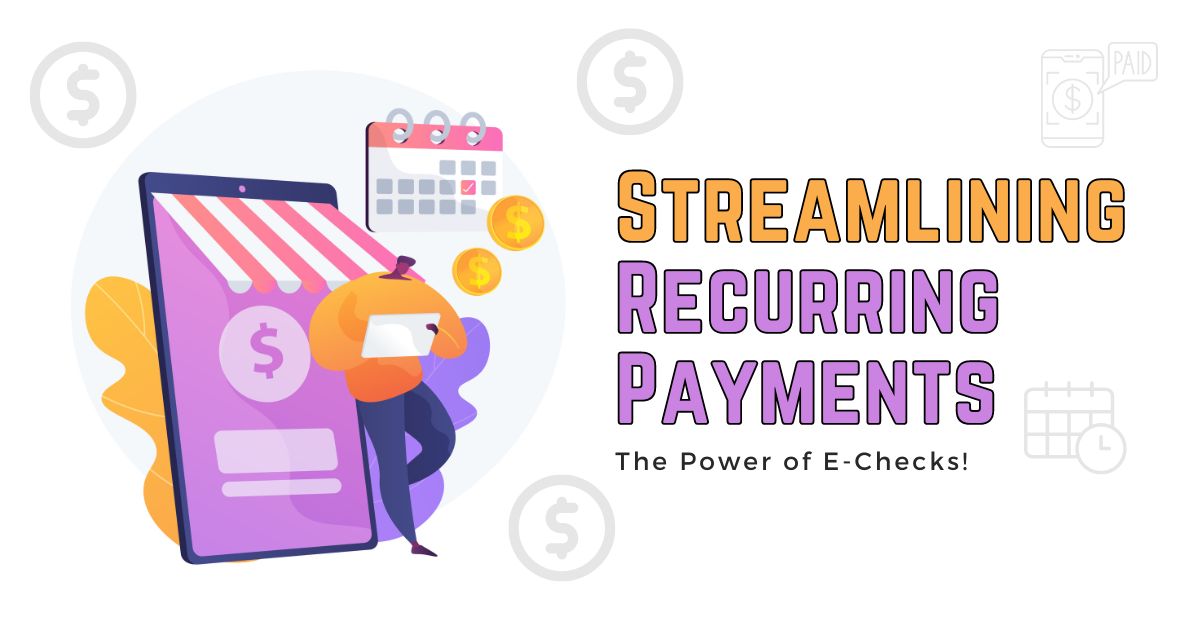
| January 2nd, 2024 |
Streamlining Recurring Payments — The Power of E-Checks!
In the realm of modern payment methods, electronic checks, or e-checks, have emerged as a powerful tool, especially in the context of recurring payment systems. These systems are the lifeblood of many businesses, enabling regular and predictable revenue streams. However, managing recurring payments efficiently and securely can pose significant challenges. This blog aims to explore how e-checks have simplified recurring billing systems, making them a preferred choice for businesses and consumers alike.
Understanding Recurring Billing Systems —
Recurring billing systems are essential for businesses offering subscription-based services, membership plans, or installment payments. They ensure a steady inflow of revenue while providing customers with a convenient payment schedule. However, traditional methods of processing recurring payments, such as credit or debit cards, may present obstacles like card expiration, insufficient funds, or security concerns.
Enter E-Checks — Simplifying the Process:
E-checks offer a streamlined solution to these challenges. They function similarly to paper checks but are processed electronically, leveraging the Automated Clearing House (ACH) network. The advantages they offer in simplifying recurring billing systems are multifaceted:
1. Enhanced Security:
E-checks employ stringent security measures, including encryption and authentication protocols, ensuring the safety of sensitive financial information. This reassures both businesses and customers, reducing the risks associated with fraud and data breaches.
2. Lower Processing Costs:
Compared to credit card transactions that often involve higher processing fees, e-checks typically come with lower transaction costs. For businesses dealing with a high volume of recurring payments, this translates to significant cost savings over time.
3. Reduced Payment Failures:
E-checks significantly diminish the chances of payment failures due to expired cards or insufficient funds. They can be set up for automatic withdrawals, eliminating the need for manual intervention and mitigating the risk of missed payments.
4. Convenience for Customers:
Customers benefit from the ease of setting up recurring payments through e-checks. They don’t need to worry about updating card details or facing interruptions in service due to expired cards, leading to higher satisfaction and retention rates.
5. Flexibility in Payment Timing:
E-checks offer greater flexibility in payment timing. Businesses can schedule withdrawals based on specific dates or billing cycles, aligning with customers’ preferences or paydays, reducing the likelihood of missed payments.
6. Integration with Accounting Software:
E-checks seamlessly integrate with accounting software, simplifying the reconciliation process. This integration streamlines financial record-keeping, reducing manual errors and saving time during the reconciliation of payments.
7. Scalability and Accessibility:
E-checks provide scalability, accommodating businesses experiencing growth in their customer base. Additionally, they are accessible to a broader demographic, including customers without credit cards or those preferring bank-based transactions.
Implementation Best Practices —
When integrating e-checks into recurring billing systems, following best practices ensures a smooth transition and optimal utilization:
- Testing and Quality Assurance: Thoroughly testing the e-check integration to ensure compatibility and functionality within the existing billing system is crucial before full implementation.
- Compliance and Regulations: Adhering to regulatory standards such as those set by the National Automated Clearing House Association (NACHA) ensures compliance and minimizes the risk of legal complications.
- Continuous Evaluation and Improvement: Regularly assessing the performance of e-check transactions and gathering customer feedback allows for continuous improvement and optimization of the billing process.
Industry Adoption and Growth Trends —
Multiple industries are witnessing the widespread adoption of e-checks due to their benefits. Sectors like healthcare, education, and e-commerce are increasingly leveraging e-checks for their recurring payment models, signaling a broader acceptance across diverse sectors.
Future Developments and Innovation —
The evolution of e-check technology continues with ongoing innovations. These may include enhanced fraud detection algorithms, real-time transaction monitoring, and further integration with emerging payment technologies, ensuring the continued relevance and advancement of e-checks in the payment landscape.
Implementing E-Checks in Recurring Billing Systems —
To integrate e-checks into recurring billing systems effectively, businesses can utilize specialized payment processing platforms or work directly with financial institutions offering ACH services. Key steps for implementation include:
- Selecting a Reliable Payment Gateway: Choosing a reputable payment gateway equipped to handle e-check transactions securely is crucial for seamless integration.
- Customer Communication: Educating customers about the benefits of e-checks and guiding them through the setup process can encourage adoption and minimize resistance to change.
- Automating Processes: Leveraging automation tools to schedule recurring e-check payments and manage billing cycles optimizes efficiency and reduces manual intervention.
Addressing Concerns and Future Outlook —
While e-checks offer numerous advantages, concerns about security and potential transaction disputes may arise. However, continuous advancements in encryption and fraud detection technologies are continually bolstering the security of e-check transactions.
Looking ahead, the future of e-checks in recurring billing systems appears promising. As technology evolves and consumer preferences continue to shift towards seamless and secure payment options, e-checks are likely to play an increasingly pivotal role in shaping the landscape of financial transactions.
Final Thoughts —
E-checks have emerged as a game-changer in simplifying recurring billing systems for businesses of all sizes and industries. Their blend of security, cost-effectiveness, and convenience makes them an attractive alternative to traditional payment methods. By adopting e-checks, businesses can streamline their operations, reduce costs, and enhance customer satisfaction, ultimately paving the way for sustained growth and success in today’s competitive market.
